Celebrate Our Staff – January 2020
Here we celebrate our colleagues’ achievements across the University this past month.
Professsor Iyiola Solanke has been appointed to the UUK Advisory Group on Racial Harassment in Universities

UUK Advisory Group appointment
Professor Iyiola Solanke, Chair in EU Law and Social Justice, has been invited to join the Universities UK (UUK) Advisory Group on Racial Harassment in Universities.
In their 2019 study, the Equality and Human Rights Commission (EHRC) identified that Black and Minority Ethnic (BME) university students and staff experience disproportionate and unacceptable levels of racial harassment.
In light of this, UUK – the collective voice of 136 universities in England, Scotland, Wales and Northern Ireland – immediately convened an Advisory Group to provide guidelines on how universities should respond to this.
Professor Solanke’s role within this group will see her working with university leaders, expert academics, student representatives and interested organisations, to enable all higher education providers to take action in response to this report.
Professor Solanke said: “I applaud EHRC for its study and Universities UK for its rapid response.
“Since creating the Black Female Professors Forum I have discovered how widespread and damaging racial harassment is to talented students and academics in the sector.
“In order to make racial diversity a reality in universities, we must ensure our universities are spaces in which Black and minority ethnic staff and students can thrive.
“My hope is, first, that we can develop practical guidelines which truly make a difference to the Black and Minority Ethnic experience in higher education and, second, that we also ensure higher education institutions establish strong independent mechanisms for implementation, scrutiny and challenge of their action plans to tackle racial harassment.”
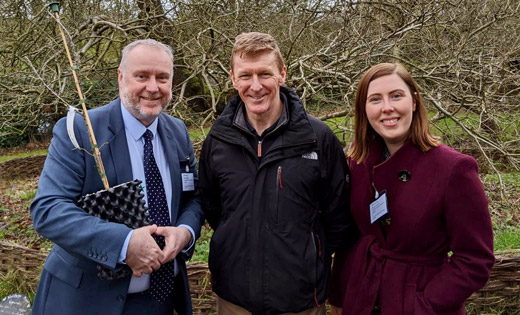 One of the ‘space saplings’, with Dr Jade French, astronaut Tim Peake and Catalyst CEO Martin Pearson (Image credit: Catalyst Science Discovery Centre)
One of the ‘space saplings’, with Dr Jade French, astronaut Tim Peake and Catalyst CEO Martin Pearson (Image credit: Catalyst Science Discovery Centre)
Finding a home for space saplings
Dr Jade French has played a key role in a winning bid to provide a ‘space sapling’ with a new home on Earth.
Pips from Isaac Newton’s apple tree were taken into space in 2015 on the Principia mission by astronaut Tim Peake. The pips then spent six months floating in micro gravity as part of the ‘Pips in Space’ project before returning to Earth in 2016.
The young seedlings started to emerge in 2017 and work began on finding homes for the eight young trees.
Dr French currently works at the Catalyst Science Discovery Centre and Museum part-time, as well as teaching and researching in the School of Fine Art, History of Art and Cultural Studies at Leeds.
She wrote the bid to secure one of the saplings and has since become Project Lead, managing its planting in partnership with Halton Borough Council and the public engagement programme across the borough.
The Catalyst Science Discovery Centre is one of eight winning locations, along with the likes of the Eden Project and the United Nations Office for Outer Space Affairs in Vienna.
Dr French said: “The Space Saplings project speaks strongly to my current research in the school, which seeks to innovate approaches to community engagement within museums.
“Its interwoven stories of Newton’s gravity, space exploration and horticulture will be brought to life through a dynamic series of school projects, community-led participatory programmes and educational workshops, igniting curiosity across the borough for years to come.”
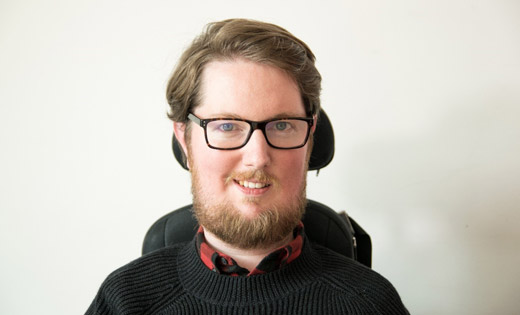 The Leverhulme Trust has awarded an Early Career Fellowship to Dr Miro Griffiths
The Leverhulme Trust has awarded an Early Career Fellowship to Dr Miro Griffiths
Leverhulme Trust Fellowship honour
Dr Miro Griffiths has been awarded a Leverhulme Trust Early Career Fellowship, allowing him to embark on a three-year research project exploring young disabled people’s views and experiences of disability activism across Europe.
Dr Griffiths said: “I am delighted to accept the Leverhulme Early Career Fellowship and have the opportunity to spend the next three years dedicated to research.
“It is paramount that young disabled people have the opportunity to engage in resistance and challenge the extensive marginalisation experienced by the disabled people's community.
“It is my intention that this research will provide insight into supporting young disabled people to access opportunities of protest, campaign and activism.”
The project will consist of four parts:
- quantitative analysis of survey data
- qualitative analysis of in-depth interviews with disabled activists
- two ‘future laboratory workshops’ that explore the role of activism and social movements in building towards an inclusive, fair and just society; and
- production of a film documentary exploring the organisation of contemporary activism, resistance practices and disabled people’s movements across Europe.
Dr Griffiths added: “I also want to spend the next three years ensuring that my research is useful to disabled activists and their organisations, in our determination to realise disabled people's emancipation.
“Colleagues at the School of Sociology and Social Policy provided immense guidance to me during the development of the research proposal. This award reflects the excellent knowledge and support provided by those whom I have the chance to work alongside and I would like to thank them.”
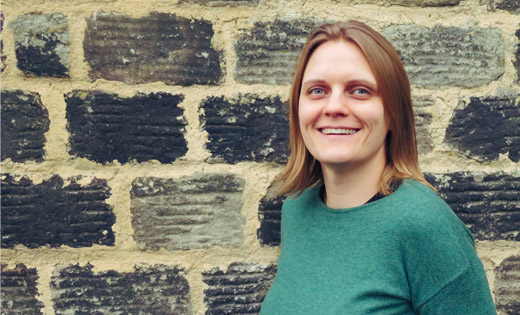 The Quaternary Research Association’s Lewis Penny Medal has been awarded to Dr Natasha Barlow
The Quaternary Research Association’s Lewis Penny Medal has been awarded to Dr Natasha Barlow
Lewis Penny Medal win for Quaternary historian
Dr Natasha Barlow, Associate Professor in the School of Earth and Environment, has been awarded the Quaternary Research Association’s Lewis Penny Medal.
This award is given to a young researcher who has a made a significant contribution to research into the Quaternary history (the past 2.6 million years) of the British Isles and its maritime environment.
Dr Barlow’s research focuses on how and why the sea level has changed in the past, in particular in regards to changing climate.
She has also worked on abrupt events associated with earthquakes, tsunamis and storms and leads the Faculty of Environment Leeds Quaternary group.
Dr Barlow said; “It is an honor to be awarded the Lewis Penny Medal in recognition of more than a decade of work into the Quaternary environments of the UK and further afield.
“My team uses a range of techniques to understand how ice, sea level and climate all impact upon each other. Though we focus on the past, increased understanding of these interactions has relevance for the future.
“This award is also recognition of the wonderful colleagues, students and friends I have had the pleasure of working with.
“The QRA has been an important part of my research life since attending my first meeting in 2007 as a PhD student. It was an amazing to be awarded it whilst hosting the annual conference in Leeds for the first time in its 56-year history.”
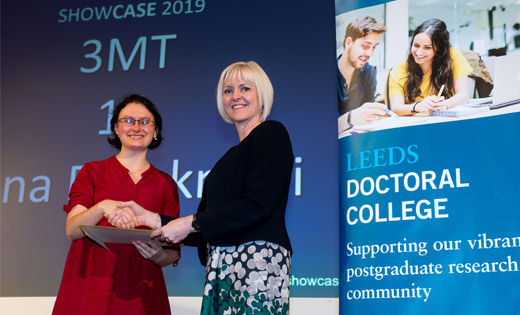 Professor Lisa Roberts presents Dr Anna Berekmeri (left) with her prize
Professor Lisa Roberts presents Dr Anna Berekmeri (left) with her prize
3 Minute Thesis prize
Dr Anna Berekmeri has won first prize at the 2019 Leeds Doctoral College Showcase's 3 Minute Thesis Competition.
She told attendees about the development of a non-invasive technique to diagnose inflammatory skin diseases.
Called tape stripping, it sees a simple tape applied to skin with gentle pressure and, when removed, collects a superficial layer of skin without causing harm or pain to the patient.
The tape is then processed in a laboratory in order to identify molecules that could distinguish between different skin diseases. This method is designed to replace invasive biopsies and could potentially also be used to predict disease course and response to treatment.
Dr Berekmeri said: “It was an honour to receive the best prize for the 3 Minute Thesis Competition, especially as the quality of presentations was excellent. It always feels great to have recognition for your work.
“As always, this is the result of a team effort and I am fortunate to have great project supervisors; Dr Miriam Wittmann, from the Faculty of Medicine and Health, and Dr Martin Stacey, from the Faculty of Biological Sciences.
“Unfortunately, it is often underestimated what deep impact skin diseases, such as eczema or psoriasis, can have on the life of patients. Therefore, skin research is usually out of the spotlight, so it was great to have the opportunity to shine some light on it.”
The competition forms part of a larger national contest. Dr Berekmeri will now have the opportunity to showcase the project online in the national semi-finals, and potentially at the national final event.
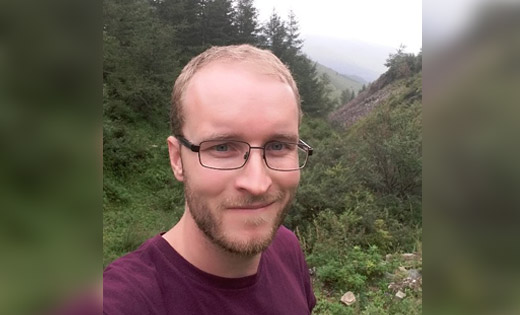 The Royal Astronomical Society’s 2020 Fowler Award has been won by Dr Craig Magee
The Royal Astronomical Society’s 2020 Fowler Award has been won by Dr Craig Magee
Flying high with the Royal Astronomical Society:
2020 Fowler Award
Dr Craig Magee, Natural Environment Research Council (NERC) Independent Research Fellow, has won the Royal Astronomical Society’s (RAS) 2019 Fowler Award.
The prize was for key breakthroughs in understanding the influence of igneous intrusions on faulting and evolution of sedimentary basins.
Dr Magee said: “To receive the Fowler Award for Geophysics is an amazing honour and one that would not have been possible without support from a whole host of people, particularly my mentor from Imperial College, Professor Christopher Jackson.
“Understanding volcanoes and all that is associated with them, including the natural hazards and potential mineral, metal and energy resources, requires being able to visualise entire volcanic systems in 3D.
“My work, which has really been a team effort with colleagues and friends around the world, has been at the current forefront of using seismic reflection data to study ancient volcanic systems in 3D.
“These data provide ultrasound-like images on Earth’s subsurface and allows us to peer inside volcanoes and study the network of pipes feeding magma to them in unprecedented detail.”
RAS was founded in 1820 and is currently celebrating its bicentennial year. The organisation encourages and promotes the study of astronomy, solar-system science, geophysics and closely related branches of science.
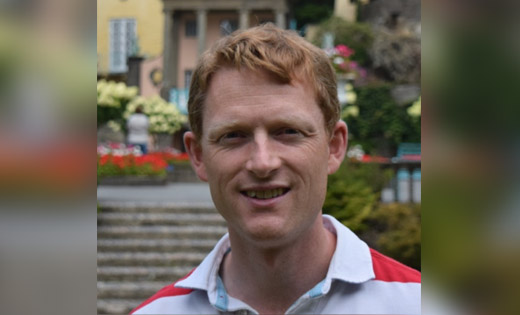 The Royal Astronomical Society’s 2020 Price Medal was awarded to Dr Phil Livermore
The Royal Astronomical Society’s 2020 Price Medal was awarded to Dr Phil Livermore
2020 Price Medal
The RAS has also honoured Dr Phil Livermore – Associate Professor in the School of Earth and Environment and Director of the Institute of Geophysics and Tectonics – with the 2020 Price Medal for his research into the dynamics of Earth’s core.
The medal is awarded annually for investigations of outstanding merit into the dynamics of Earth or planetary interiors.
Dr Livermore’s research integrates mathematical modelling of the flow of molten iron within Earth’s core with high-resolution data from satellites that measure Earth’s magnetic field.
He was able to infer an accelerating jet at high latitude within the core that explains the recent changes in the magnetic field.
Dr Livermore said: “I am deeply honoured to receive the Price medal; it means a lot that my research was recognised by the Royal Astronomical Society.”
The research demonstrated the scientific value of satellite data measurement for deep-Earth studies, as well as stimulating significant public interest in the geomagnetic field.
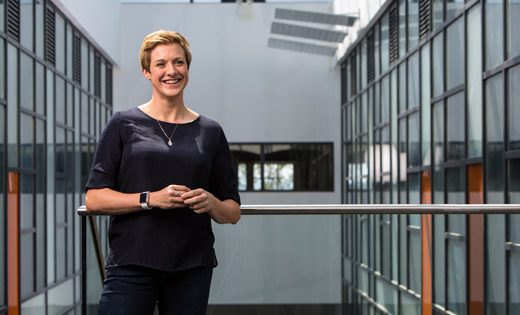 The German Law Journal has appointed Dr Jen Hendry as one of its Editors-in-Chief
The German Law Journal has appointed Dr Jen Hendry as one of its Editors-in-Chief
Editors-in-Chief appointment
Associate Professor in Law and Social Justice Dr Jen Hendry has been appointed to the Editors-in-Chief of the German Law Journal.
The German Law Journal (GLJ) is an open-access, web-based journal that celebrates its 20th anniversary this year.
It recently joined the Cambridge University Press stable and continues to grow, with a no-fee subscriber list of more than 5,000 readers and thousands of downloads annually.
Despite its name, the GLJ prides itself on being an international, collaborative peer-review product that provides opportunity to stimulate interdisciplinary research. It has published many leading scholars, commentators and practitioners in a range of law-related fields.
It has also been cited in influential reports and the German Federal Constitutional Court.
The Editors-in-Chief consist of four scholars, who are based in Germany and the UK, along with founding editor, Russell Miller, in the USA.
Dr Hendry said: “I was a member of the editorial board from 2011, so I was delighted to make the step up. I research in legal and social theory, and in comparative socio-legal studies, and I think this expertise plus my editorial board experience are the reasons I was asked.”
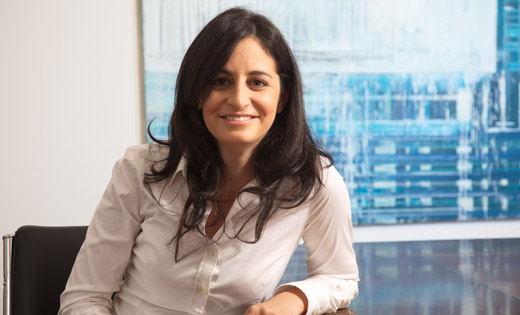 Best Publication of the Academic Year 2018-2019 for young researchers has been won by Dr Or Brook
Best Publication of the Academic Year 2018-2019 for young researchers has been won by Dr Or Brook
Best publication award for competition law lecturer
Dr Or Brook, a lecturer of competition law at Leeds, has been awarded the University of Amsterdam’s Law Faculty Prize for the Best Publication of the Academic Year 2018-2019 for young researchers.
The prize was awarded for her article ‘Struggling with Article 101 (3) TFEU: Diverging approaches of the Commission, EU courts, and five competition authorities’, published in the Common Market Law Review.
Her paper highlights a core assumption of a major 2004 EU competition law reform; that the 28 EU national competition authorities (NCAs) enforcing it would apply treaty provisions in the same way, despite wide margins of discretion to allow for differing national, economic and political traditions.
Based on a large database of more than 3,100 cases, Dr Brooks’ work questions this assumption.
It presents empirical evidence indicating that the Commission, EU courts and five NCAs have followed very different interpretations of the law, leading to a fragmented enforcement.
This is an illustrative example of the struggle between the different competition authorities in shaping the future of EU competition policy.
Dr Brook said: “I’m truly honored to receive this award, especially since the empirical study of EU and competition law is an unusual approach in Europe. I believe that this recognition from the University of Amsterdam is a testament that this is starting to change.”
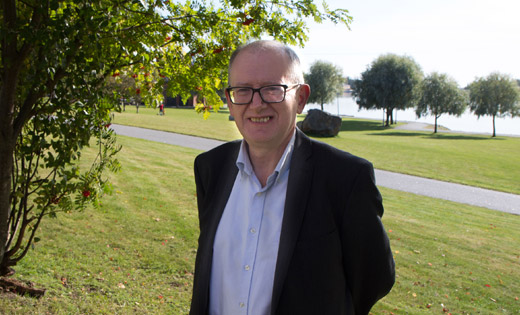 Professor Gerard McCormack has received the INSOL Scholars Award
Professor Gerard McCormack has received the INSOL Scholars Award
INSOL Scholar Award 2020-21
Professor Gerard McCormack has won the INSOL Scholar Award for 2020-2021.
INSOL is the leading international organisation of lawyers and other professionals working in the field of insolvency and restructuring.
In order to work more closely with its academic members, INSOL appoints a scholar for a fixed two-year period.
The purpose of the INSOL Scholar Award is to work with a senior scholar on a specific area of research for the benefit of not only the academic members but also for the benefit of INSOL International’s general membership.
Professor McCormack will be writing a research paper on ‘Priorities and Fairness in Insolvency and Business Restructuring’, potentially followed by contributions to other INSOI publications.
He is a long-standing member of INSOL International Academic Group and frequent speaker and attendee at INSOL Academic Colloquia.
The award generated huge interest, making picking a proposal from a strong selection of applications a tough task for the independent panel.
Professor McCormack said: “I am very pleased to be awarded the title of INSOL Scholar for 2020-2021. This award should strengthen my links with practitioners and enhance the international and practical dimensions of my research.”
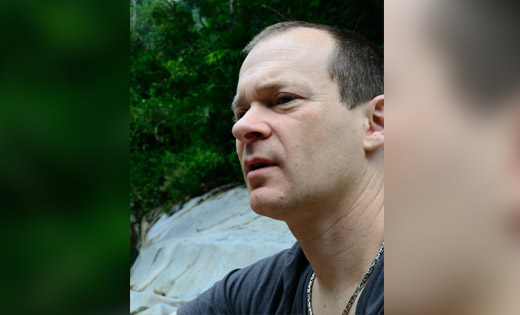
Professor is highly cited researcher
Professor Oliver Phillips (Geography) has been selected as a highly cited researcher by The Web of Science Group.
The list represents the scientists and social scientists who have demonstrated significant influence through the publications of a number of highly cited papers in the past 10 years.
These highly-cited papers rank in the top 1% by citations for field and year in Web of Science.
As part of his recent research, Professor Phillips has been central to creating and leading RAINFOR and ForestPlots.net in order to analyse the world’s tropical forests whilst also empowering tropical scientists.
These global networks, coordinated from Leeds, have helped create some extraordinary collaborations. For example, ForestPlots.net allows contributors anywhere to manage, compare and analyse the complex information from their long-term forest biodiversity and forest carbon records.
Professor Phillips said; “With our tropical partners we are producing exceptional science together – including discovering the huge carbon sink in tropical forests, quantifying its sensitivity to drought and understanding how, where and why tropical forests are changing.”
He added, “Our global success depends critically on key contributions and leadership by colleagues within our Ecology and Global Change group in Geography.”
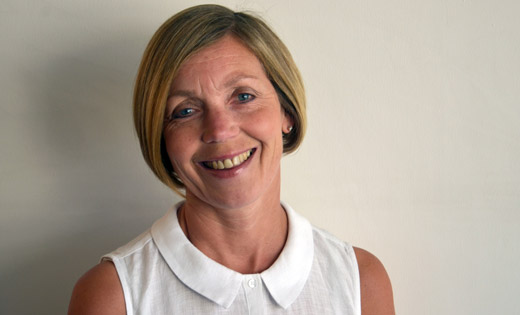 Jenny Tucker has been appointed Commercial Director of the Facilities Directorate
Jenny Tucker has been appointed Commercial Director of the Facilities Directorate
New Commercial Director appointed
Jenny Tucker has been appointed the University’s new Commercial Director.
Working within the Facilities Directorate, her role will include being responsible for leading the strategic development of Leeds’ commercial services and driving value and income for the University to support our academic vision.
Jenny joins the University with a wealth of experience, having worked in the higher education sector for 25 years.
Her previous role was as Interim Chief Operating Officer for the University of Liverpool, which involved working closely with the Vice-Chancellor to provide strategic leadership to Professional Services.
She was also previously Director of Facilities, Residential and Commercial Services, where her large and diverse portfolio also included Estates, Sport and Ness Botanic Gardens.
Experience prior to this includes being board director of the University of Liverpool energy and construction companies, as well as at Sciontec – The Knowledge Quarter development company for the Liverpool City Region – and various director roles at Keele University.
But what about outside work?
“I am great fan of the outdoors and love walking, cycling and open water swimming, but I have definitely been surprised by just how hilly the University is since I joined,” she said.
“I also like to read and relax doing yoga and Pilates.”
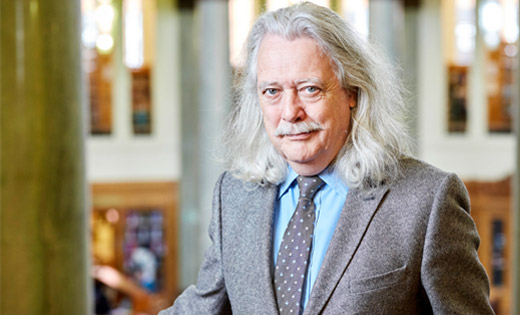 Professor Derek B Scott has completed a major project investigating the success of English versions of German operetta between 1900 and 1940
Professor Derek B Scott has completed a major project investigating the success of English versions of German operetta between 1900 and 1940
Operetta research hits a high note
Professor of Critical Musicology Derek B Scott has published work as part of the major outcomes of an operetta research project.
One is Scott’s monograph German Operetta on Broadway and in the West End.
Another is the Cambridge Companion to Operetta, edited by Scott and Anastasia Belina, who was a senior research fellow researching German operetta in Warsaw.
The work investigated what lay behind the success of English versions of German operetta in the period 1900–1940, when more than 60 operettas from the German stage were produced in the West End and in excess of 70 made it to Broadway.
Besides visits to archives, libraries and theatre museums in Berlin, London, New York and Vienna, the project also included a study of all those involved in the cultural transfer of operetta: the composers, authors, theatre managers, music publishers and record companies etc.
As the project progressed, workshops, concerts and study days were organised in Leeds and London. The project’s findings were also the subject of Professor Scott’s invited keynote presentations in Europe and North America.
Professor Scott said: “I’m delighted the project’s outcomes were all achieved and that the concluding international operetta conference at Leeds was praised by Amsterdam’s Operetta Research Centre for moving research into operetta forward.”
You can find out more about Professor Scott’s work, and view public domain vocal scores related to his research, by visiting the project’s website.
Please contact Internal Communications if you or one of your colleagues would like to appear in this monthly feature. This is open to all staff – professional and academic.
Posted in: University news